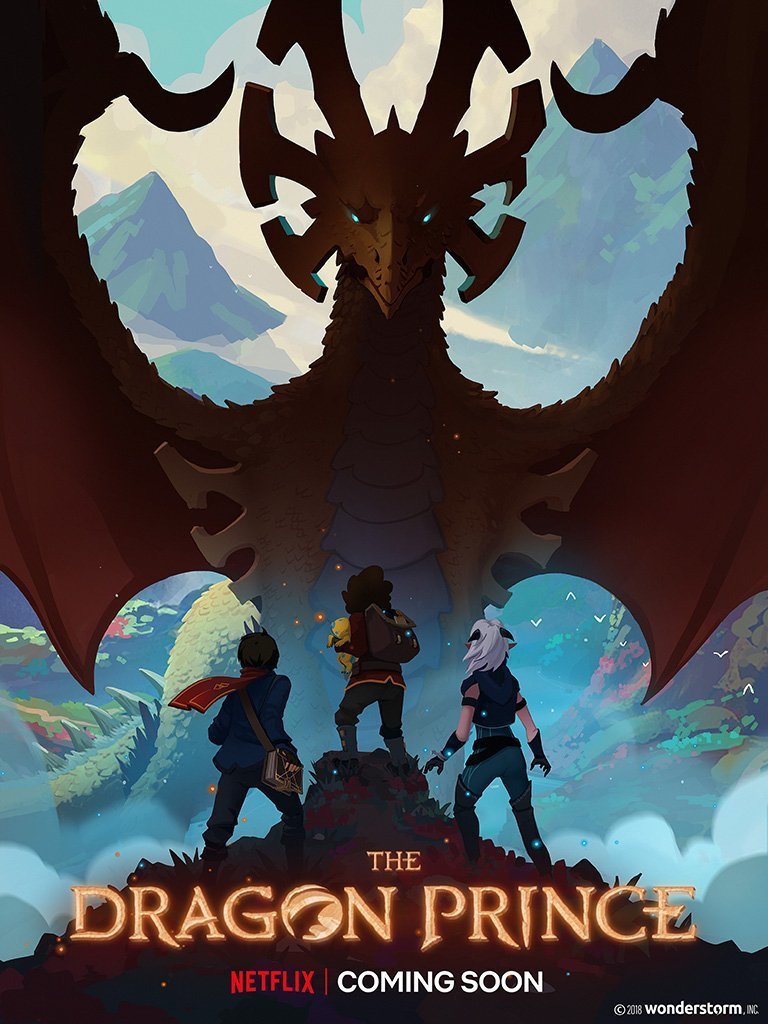Read the next entry here.
The series gets off to a strong start.
1.1, "Echoes of Thunder"
Written by Aaron Ehasz and Justin Richmond
Directed by Giancarlo Volpe, Meruan Salim, Villads Spangsberg, and Lih Liau
Synopsis
 |
| It is pretty. Image taken from the episode, used for commentary |
Disembodied narration establishes a broad historical context for the events of the series. Xadia, the continent on which the series occurs, had been united and beautiful, charged with magic from six major sources: sun, moon, stars, earth, sky, and ocean. Humanity uncovered another power, a dark magic attained by taking the lives of magical creatures, that led to its exile from the eastern part of the continent and antagonism between humanity and the sentient magical creatures in the east--dragons and elves, particularly. The border was contested despite the involvement of the king of dragons; humans slew that king and disposed of its heir. War appears imminent.
 |
| Seems typical. Image taken from the episode, used for commentary |
The next morning, the advisor, Viren, consults a peculiar mirror before being interrupted with the guard's report. He takes the message to his king, Harrow, waking him with the news of an impending assassination attempt. Harrow orders a search for the party of elves against the threat.
 |
| Seems serious. Image taken from the episode, used for commentary |
 |
| Seems serious. Image taken from the episode, used for commentary |
Viren sends Soren out with a search party to take the elves. Claudia purposes to assist. So does Callum, though Soren denies him the opportunity. The elves, meanwhile, enact a ritual that commits them to killing Harrow--and Ezran. Rayla voices some hesitation. Callum tries to impress on Ezran the seriousness of the situation; the child reacts poorly. The search party fails to find its target despite magical aid, but Rayla's duplicity is revealed and rebuked.
Discussion
One thing that strikes me as I rewatched the episode (I'd seen it several times previously; my daughter rather likes the show). The Moonshadow Elves, given their accents and their markings, come across as something of a stand-in for popular presentations of Picts and Scots, with Katolis not unlike common concepts of high medieval England. It's an interesting bit of callout. (So, too, are the nods to The Karate Kid and George R.R. Martin; there is a clear picture of the show's target and presumed secondary audiences.)
More important, though, is that since The Dragon Prince is set in an overtly medievalist milieu, it admits of quite a bit of examination of its mis/use of popular and scholarly conceptions of medieval Europe. One way in which it decidedly speaks to the latter is in the portrayal of a multiethnic kingdom of Katolis. Despite persistent wrong-headed ideas about what Helen Young calls "the monochrome Middle Ages" (here and here, for instance), medieval Europe was far from homogenous--as is amply attested and argued (for instance here, here, here, here, here, and here, as well as in many other places by many scholars far more accomplished and capable than I). To have a diverse cast--both on screen and among the voice actors--is a good and right thing. (That there are other problems at work, by report, is acknowledged.)




